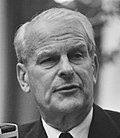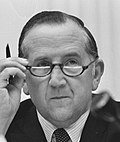Second Biesheuvel cabinet
Second Biesheuvel cabinet | |
|---|---|
Cabinet of the Netherlands | |
  The members of the Second Biesheuvel cabinet in the House of Representatives on 17 August 1972 | |
| Date formed | 9 August 1972 |
| Date dissolved | 11 May 1973 275 days in office (Demissionary from 29 November 1972) |
| People and organisations | |
| Head of state | Queen Juliana |
| Head of government | Barend Biesheuvel |
| Deputy head of government | Roelof Nelissen Molly Geertsema |
| No. of ministers | 14 |
| Ministers removed | 1 |
| Total no. of members | 14 |
| Member party | Catholic People's Party (KVP) People's Party for Freedom and Democracy (VVD) Anti-Revolutionary Party (ARP) Christian Historical Union (CHU) |
| Status in legislature | Centre-right Caretaker government |
| History | |
| Election | 1971 election |
| Outgoing election | 1972 election |
| Legislature terms | 1971–1972 |
| Incoming formation | 1971 formation |
| Outgoing formation | 1972–1973 formation |
| Predecessor | First Biesheuvel cabinet |
| Successor | Den Uyl cabinet |
| Part of the Politics series |
![Azure, billetty Or a lion with a coronet Or armed and langued Gules holding in his dexter paw a sword Argent hilted Or and in the sinister paw seven arrows Argent pointed and bound together Or. [The seven arrows stand for the seven provinces of the Union of Utrecht.] The shield is crowned with the (Dutch) royal crown and supported by two lions Or armed and langued gules. They stand on a scroll Azure with the text (Or) "Je Maintiendrai" (French for "I will maintain".)](https://upload.wikimedia.org/wikipedia/commons/thumb/8/8f/State_coat_of_arms_of_the_Netherlands.svg/150px-State_coat_of_arms_of_the_Netherlands.svg.png) |
|---|
|
|
The second Biesheuvel cabinet was the executive branch of the Dutch Government from 9 August 1972 until 11 May 1973. The cabinet was formed by the christian-democratic Catholic People's Party (KVP), Anti-Revolutionary Party (ARP) and Christian Historical Union (CHU) and the conservative-liberal People's Party for Freedom and Democracy (VVD) after the fall of the previous Cabinet Biesheuvel I. The cabinet was a centre-right caretaker government and had a minority in the House of Representatives. Protestant Leader Barend Biesheuvel of the Anti-Revolutionary Party served as Prime Minister. Prominent Catholic politician Roelof Nelissen served as Deputy Prime Minister and Minister of Finance and former Liberal Leader Molly Geertsema served as Deputy Prime Minister and Minister of the Interior. The rump cabinet served until the election of 1972.[1]
Formation
Following the fall of the First Biesheuvel cabinet the Democratic Socialists '70 (DS'70) left the coalition and the Catholic People's Party, People's Party for Freedom and Democracy, Anti-Revolutionary Party and the Christian Historical Union formed a Rump cabinet. Because the following negotiations for forming the next cabinet took rather long, the cabinet took further reaching decisions than a caretaker cabinet is usually supposed to do.
Cabinet Members
- Resigned
- Retained from the previous cabinet
- Continued in the next cabinet
- Acting
- Appointment European Commissioner
References
- ^ "Ideeën van Drees jr. waren te afwijkend" (in Dutch). Volkskrant. 8 September 1998. Retrieved 20 March 2018.
External links
- Official
- (in Dutch) Kabinet-Biesheuvel I en II Parlement & Politiek
- (in Dutch) Kabinet-Biesheuvel Rijksoverheid
























